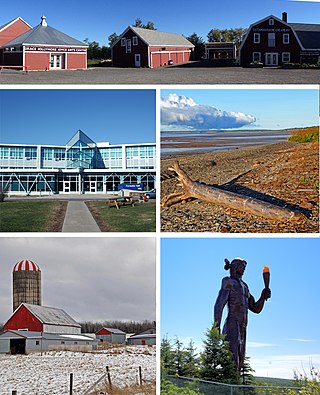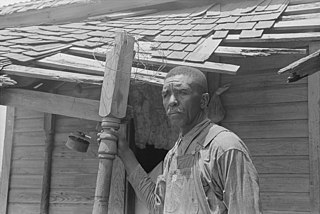
Colchester County is a county in the Canadian province of Nova Scotia. With a population of 51,476 the county is the fourth largest in Nova Scotia. Colchester County is located in north central Nova Scotia.

A tenant farmer is a person who resides on land owned by a landlord. Tenant farming is an agricultural production system in which landowners contribute their land and often a measure of operating capital and management, while tenant farmers contribute their labor along with at times varying amounts of capital and management. Depending on the contract, tenants can make payments to the owner either of a fixed portion of the product, in cash or in a combination. The rights the tenant has over the land, the form, and measures of payment vary across systems. In some systems, the tenant could be evicted at whim ; in others, the landowner and tenant sign a contract for a fixed number of years. In most developed countries today, at least some restrictions are placed on the rights of landlords to evict tenants under normal circumstances.

The Soil Association is a British registered charity, working to transform the way Britain eats, farms and cares for the natural world. It was established in 1946. Their activities include campaigning for local purchasing, public education on nutrition and certification of organic foods, and against intensive farming.

The National Coal Board (NCB) was the statutory corporation created to run the nationalised coal mining industry in the United Kingdom. Set up under the Coal Industry Nationalisation Act 1946, it took over the United Kingdom's collieries on "vesting day", 1 January 1947. In 1987, the NCB was renamed the British Coal Corporation, and its assets were subsequently privatised.
Holwick is a small village in Teesdale, County Durham (district), England. Located in the Pennine hills, it consists of a few houses spread along a road in the pattern of a linear settlement. As the population taken at the 2011 Census was less than 100, details are maintained in the parish of Lunedale.

The Booker T. Washington National Monument is a National Monument near the community of Hardy, Virginia, and is located entirely in rural Franklin County, Virginia. It preserves portions of the 207-acre (0.90 km2) tobacco farm on which educator and leader Booker T. Washington was born into slavery on April 5, 1856. It provides interpretation of Washington's life and achievements, as well as interpretation of 1850s slavery and farming through the use of buildings, gardens, crafts and animals.

The Countryside and Rights of Way Act 2000, known informally as the CRoW Act or "Right to Roam" Act is a United Kingdom Act of Parliament affecting England and Wales which came into force on 30 November 2000.

Robert Lee "Bob" Doughton, of Alleghany County, North Carolina, sometimes known as "Farmer Bob", was a member of the United States House of Representatives from North Carolina for 42 consecutive years (1911–1953). A Democrat originally from Laurel Springs, North Carolina, he was the Dean of the United States House of Representatives for his last few months in Congress. He is the longest-serving member ever of the United States House of Representatives from the state of North Carolina. In the 1930s Doughton was a key player in the creation of the Blue Ridge Parkway and the passage of the Social Security Act.

The 79th United States Congress was a meeting of the legislative branch of the United States federal government, composed of the United States Senate and the United States House of Representatives. It met in Washington, D.C., from January 3, 1945, to January 3, 1947, during the last months of Franklin D. Roosevelt's presidency, and the first two years of Harry Truman's presidency. The apportionment of seats in this House of Representatives was based on the 1940 United States census.

Victor Alfred Knox was a politician from the U.S. state of Michigan. He served six terms in the United States House of Representatives from 1953 to 1965.
The Rand railway line is a closed railway line in New South Wales, Australia. The line ran for 53 km south-west to the town of Rand from the Main South railway line at Henty.

Hill farming or terrace farming is an extensive farming in upland areas, primarily rearing sheep, although historically cattle were often reared extensively in upland areas. Fell farming is the farming of fells, a fell being an area of uncultivated high ground used as common grazing. It is a term commonly used in Northern England, especially in the Lake District and the Pennine Dales. Elsewhere, the terms hill farming or pastoral farming are more commonly used.
Agricultural law, sometimes referred to as Ag Law, deals with such legal issues as agricultural infrastructure, seed, water, fertilizer, pesticide use, agricultural finance, agricultural labour, agricultural marketing, agricultural insurance, farming rights, land tenure and tenancy system and law on Agricultural processing and rural industry. With implementation of modern technologies, issues including credit, intellectual property, trade and commerce related to agricultural products are dealt within the sphere of this law.
Kowen is a district in the Australian Capital Territory in Australia. It is situated in the northeast corner of the ACT, to the east of Sutton Road and the town of Queanbeyan, New South Wales. Kowen is primarily covered by pine forests, and is also used for farming. The main highway between the ACT and the south coast region, the Kings Highway, runs directly through the Kowen.

Ravensbourne is a rural locality in the Toowoomba Region, Queensland, Australia. In the 2016 census, Ravensbourne had a population of 248 people.

The Wildlife and Natural Environment (Scotland) Act 2011 or WANE Act is an Act of the Scottish Parliament which introduced legislation to that country, affecting the way land and the environment is managed. The Act also amended earlier environmental legislation, including the Wildlife and Countryside Act 1981 and the Deer (Scotland) Act 1996.
The Hemp Farming Act of 2018 was a proposed law to remove hemp from Schedule I controlled substances and making it an ordinary agricultural commodity. Its provisions were incorporated in the 2018 United States farm bill that became law on December 20, 2018.
Arthur Robson Wannop OBE FRSE (1900–1972) was a 20th-century British agriculturalist and authority on hill-farming. He was the first director of the Hill Farming Research Organisation and was a principle deviser of the Hill Farming Act 1946.












